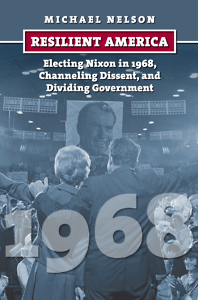You think the presidential election of 2016 was crazy? Consider 1968. That year saw President Lyndon Johnson drop out of the race, a grassroots anti-war campaign coalesce around the enigmatic senator Eugene McCarthy, the assassination of candidate Robert F. Kennedy (on the heels of Martin Luther King Jr.’s assassination), the demise of Nelson Rockefeller’s brand of moderate Republicanism, the first campaign of Ronald Reagan, the third-party candidacy of segregationist firebrand George Wallace, and blood on the streets of Chicago during the Democratic National Convention. The year ended in victory for Richard Nixon, whose shadow looms over American politics still. Yet as Memphis author Michael Nelson argues in his insightful history Resilient America, our political system ably withstood the chaos.
 Nelson, the Fulmer Professor of Political Science at Rhodes College, is a senior fellow at the University of Virginia’s Miller Center and the author of numerous books on the American presidency and Southern politics. Resilient America won the Richard E. Neustadt Award from the American Political Science Association. It is newly available in paperback. He recently answered questions via email from Chapter 16>:
Nelson, the Fulmer Professor of Political Science at Rhodes College, is a senior fellow at the University of Virginia’s Miller Center and the author of numerous books on the American presidency and Southern politics. Resilient America won the Richard E. Neustadt Award from the American Political Science Association. It is newly available in paperback. He recently answered questions via email from Chapter 16>:
Chapter 16: During the 2016 presidential election, political commentators frequently mentioned the election of 1968. Do you see any parallels there?
Michael Nelson: Certainly the emergence of populism on the right in 1968 appeared with even greater force in the Donald Trump campaign. By right-wing populism I mean white working-class resentment less of big business and Wall Street (the historical targets of left-wing populism) than of cultural elites in the media, college campuses, and government. Even so, Bernie Sanders’s strong challenge for the Democratic nomination showed that old-style left-wing populism has some life in it, as well. Richard Nixon, the Republican nominee, played on these cultural resentments subtly and was narrowly elected. George Wallace played on them overtly and did remarkably well for an independent candidate.
Chapter 16: On June 6, 1968, just as he won the Democratic primary in California, Robert F. Kennedy was tragically assassinated. Had he lived, what might have been his impact upon the election?
Nelson: No one can answer a “what if” question with complete confidence, but it’s unlikely that Kennedy would have won the Democratic nomination. Surveys of both Democratic voters and convention delegates placed Vice President Hubert Humphrey in a clear lead. But Kennedy almost certainly would have had enough clout to persuade Humphrey to add a peace-in-Vietnam plank to the party platform. When Humphrey finally did embrace that position in late September it gave his candidacy a boost, which might have been enough to win the November election if it had come a month earlier at the convention.
Chapter 16: In 1968 George Wallace launched the most influential third-party campaign since Theodore Roosevelt ran under the Progressive Party in 1912. Why did Wallace run, and how did he shape the election?
Nelson: Wallace ran in part because he didn’t see “a dime’s worth of difference” between the two major parties and in part because he loved the spotlight and was always running for something. In 1968 the presidential election was the only game in town. He had challenged President Johnson in three Democratic primaries in 1964 without being granted a single delegate and decided to run as an independent in 1968 because he knew from that experience that party leaders wouldn’t let him anywhere near the nomination no matter how well he did in the primaries.
Chapter 16: We tend to understand the 1960s through the stories of the left: the civil-rights struggle, the anti-war movement, the counterculture. But the decade is formative for the right, too. How did a conservative grassroots movement shape the 1968 election?
Nelson: Grassroots conservatives won the Republican nomination for Sen. Barry Goldwater in 1964 and despite his landslide defeat in that election weren’t about to let loose of the party in 1968. Their problem was that at the time of the first primaries in 1968 their new hero, Ronald Reagan, had only been governor of California for one year. Even so Reagan’s last-minute candidacy posed the greatest threat to Nixon’s nomination. Nixon survived this challenge only because he had spent the previous four years cultivating conservative support.
Chapter 16: Did Richard Nixon and the Republicans win the election, or did Hubert Humphrey and the Democrats lose it?
Nelson: Not to be facetious, but the answer is yes. Nixon ran a brilliant campaign for the nomination, erasing his image as a “loser” by winning every primary and placating all wings of the party. He entered the general election with a big lead over Humphrey and then made the mistake of trying to sit on it. Once Humphrey proposed stopping the bombing of North Vietnam, his campaign took off to the point that the results were close. To Nixon’s credit, however, he won the election even though the Democrats were the clear majority party in the country at the time.
Chapter 16: What are the legacies of the presidential election of 1968? Does it reveal more continuity or change in American politics?
Nelson: What 1968 showed, and this is the reassuring lesson for today, is how resilient the American constitutional system is. When you think of the strains placed on that system in 1968—assassinations, riots, college campuses in turmoil, a president driven from office, and more—the Constitution’s ability to withstand those strains, channel dissent in constructive ways, and endure is heartening.

Aram Goudsouzian chairs the history department at the University of Memphis. His most recent book is Down to the Crossroads: Civil Rights, Black Power, and the Meredith March Against Fear.
Tagged: Nonfiction





